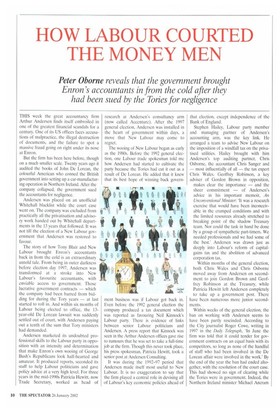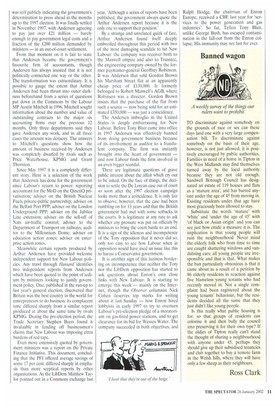HOW LABOUR COURTED THE MONEY MEN
Peter Oborne reveals that the government brought
Enron's accountants in from the cold after they had been sued by the Tories for negligence
THIS week the great accountancy firm Arthur Andersen finds itself embroiled in one of the greatest financial scandals for a century. One of its US offices faces accusations of malpractice, the illegal destruction of documents, and the failure to spot a massive fraud going on right under its nose at Enron.
But the firm has been here before, though on a much smaller scale. Twenty years ago it audited the books of John De Lorean, the colourful American who conned the British government into setting up a car-manufacturing operation in Northern Ireland. After the company collapsed, the government sued the accountants for negligence.
Andersen was placed on an unofficial Whitehall blacklist while the court case went on. The company was excluded from practically all the privatisation and advisory work handed out by Whitehall departments in the 13 years that followed. It was not till the election of a New Labour government that Andersen was restored to favour.
The story of how Tony Blair and New Labour brought Enron's accountants a. § back in from the cold is an extraordinary v
untold tale. From being in outer darkness before election day 1997, Andersen was transformed at a stroke into New Labour's favourite accountants, with enviable access to government. Those lucrative government contracts — which the company had been barred from bidding for during the Tory years — at last started to roll in. And within six months of Labour being elected to office, the 13year-old De Lorean lawsuit was suddenly settled out of court, with Andersen paying out a tenth of the sum that Tory ministers had demanded.
Andersen marketed its undoubted professional skills to the Labour party in opposition with an intensity and determination that make Enron's own wooing of George Bush's Republicans look half-hearted and amateur. It produced reports, seconded its staff to help Labour politicians and gave policy advice at a very high level. For three years in the mid-1990s Patricia Hewitt, now Trade Secretary, worked as head of research at Andersen's consultancy arm (now called Accenture). After the 1997 general election. Andersen was installed in the heart of government within days, a move that New Labour may come to regret.
The wooing of New Labour began as early as the 1980s. Before the 1992 general election, one Labour trade spokesman told me how Andersen had started to cultivate the party because the Tories had cut it out as a result of De Lorean. He added that it knew that its best hope of winning back govern ment business was if Labour got back in. Even before the 1992 general election the company produced a tax document which was reported as favouring Neil Kinnock's Labour party. There is evidence of links between senior Labour politicians and Andersen. A press report that Kinnock was seen in the Arthur Andersen offices gave rise to rumours that he was set to take a full-time job at the firm. Though this never took place, his press spokesman. Patricia Hewitt, took a senior post at Andersen Consulting.
It was during the 1992-97 period that Andersen made itself most useful to New Labour. It is no exaggeration to say that the firm played a central role in devising all of Labour's key economic policies ahead of that election, except independence of the Bank of England.
Stephen Hailey, Labour party member and managing partner of Andersen's accounting arm, was the key link. He arranged a team to advise New Labour on the imposition of a windfall tax on the privatised utilities. Hailey brought with him Andersen's top auditing partner, Chris Osborne, the accountant Chris Sanger and — most influentially of all — the tax expert Chris Wales. Geoffrey Robinson, a key adviser of Gordon Brown in opposition. makes clear the importance — and the sheer commitment — of Andersen's advice in his important memoir, An Unconventional Minister. 'It was a research exercise that would have been inconceivable in the cramped conditions and with the limited resources already stretched to breaking point of the shadow Treasury team. Nor could the task in hand be done by a group of sympathetic part-timers. We needed professionals and we had some of the best.' Andersen was drawn just as deeply into Labour's reform of capitalgains tax and the abolition of advanced corporation tax.
Within months of the general election, both Chris Wales and Chris Osborne moved away from Andersen on secondment to join Gordon Brown and Geoffrey Robinson at the Treasury, while Patricia Hewitt left Andersen completely to take up a government post. There have been numerous more junior secondments.
Within weeks of the general election, the ban on working with Andersen seems to have been partly rescinded. According to the City journalist Roger Cowe, writing in 1997 in the Daily Telegraph, 'In June the firm was told that it could tender for government contracts on an equal basis with its competitors, so long as none of the handful of staff who had been involved in the De Lorean affair were involved in the work.' By the end of the year the ban had ended altogether, with the resolution of the court case. This had showed no sign of clearing while the Tories were in government. Indeed, the Northern Ireland minister Michael Ancram
was still publicly indicating the government's determination to press ahead in the months up to the 1997 election. It was finally settled in November 1997. with Andersen agreeing to pay just over 121 million barely enough to pay government legal costs and a fraction of the 1200 million demanded by ministers — in an out-of-court settlement.
From that moment on it is fair to state that Andersen became the government's favourite firm of accountants, though Andersen has always insisted that it is not politically connected one way or the other.
The transformation was extraordinary. It is possible to gauge the extent that Arthur Andersen had been thrust into outer dark ness beforehand from a series of questions put down in the Commons by the Labour MP Austin Mitchell in 1996. Mitchell sought information about the number and value of outstanding contracts to the major six accounting firms over the previous 12 months. Only three departments said they gave Andersen any work, and in all three cases the amount was derisory. The answers to Mitchell's questions show how the amount of business received by Andersen was completely dwarfed by rivals such as Price Waterhouse, KPMG and Grant Thornton.
Since May 1997 it is a completely different story. Here is a selection of the work
that Andersen has done for the government since Labour's return to power: reporting accountant for the MoD on the OinetiO pri vatisation; adviser on the British Nuclear Fuels private-public partnership; adviser on the Belfast Port PPP; adviser on the London Underground PPP; adviser on the Jubilee Line extension: adviser on the sell-off of Nats air-traffic control; adviser to the Department of Transport on railways; auditor to the Millennium Dome; adviser on education action zones: adviser on enterprise action zones.
Meanwhile certain reports produced by Arthur Andersen have provided welcome independent support for New Labour poli cies. Any trawl through Hansard identifies two independent reports from Andersen which have been quoted to the point of tedi um by ministers looking to justify government policy. One, published in the run-up to last year's general election, discovered that Britain was the best country in the world for entrepreneurs to do business: its complacent tone differed sharply from a similar report produced at about the same time by rivals KPMG. During the pre-election period, the Trade Secretary Stephen Byers found it invaluable in fending off businessmen's claims that New Labour was imposing extra burdens of red tape.
Even more extensively quoted by government ministers was a report on the Private Finance Initiative. This document, conclud ing that the PFI offered average savings of some 17 per cent, differed sharply in empha sis than more sceptical reports by other organisations. As the LibDem Matthew Taylor pointed out in a Commons exchange last year, 'Although a series of reports have been published, the government always quote the Arthur Andersen report because it is the only one to support their position.'
By a strange and unrelated quirk of fate, Arthur Andersen found itself deeply embroiled throughout this period with two of the most damaging scandals to hit New Labour: the company was receiver both to the Maxwell empire and also to Transtec, the engineering company owned by the former paymaster-general Geoffrey Robinson. It was Andersen that sold Gordon Brown his Marsham Street flat at an apparently cheap price of .1130,000. It formerly belonged to Robert Maxwell's AGB, where Robinson was a director, Gordon Brown insists that the purchase of the flat from such a source — now being sold for an estimated 050,000 — was just a coincidence.
The Andersen imbroglio in the United States is deeply embarrassing for New Labour. Before Tony Blair came into office in 1997 Andersen was effectively banned from doing government business because of its involvement as auditor to a fraudulent company. The firm was instantly brought into the heart of government — and now Labour finds the firm involved in an even bigger scandal.
There are legitimate questions of grave public interest about the affair which cry out to be asked. On the face of things, the decision to settle the De Lorean case out of court so soon after the 1997 election campaign looks more than a coincidence. It is only fair to observe, however, that the case had been rumbline, on for 13 years and that the British government had met with some setbacks in the courts. It is legitimate at any rate to ask whether any pressure was put on officials by ministers to bring the court battle to an end. It is a sign of the idleness and incompetence of the Tory opposition that it never did so; only too easy to see how Labour when in opposition would have used an issue like this to harass a Conservative government.
It is another sign of this laziness bordering on incompetence that neither the Tory nor the LibDem opposition has started to ask questions about Enron's own close links with New Labour. It is starting to emerge this week — mainly on the Internet, though the Observer columnist Nick Cohen deserves top marks for writing about it last Sunday — how Enron hired lobbyists in early 1997 to try to overturn Labour's pre-election pledge of a moratorium on gas-fired power stations, and to get clearance for its bid for Wessex Water. The company succeeded in both objectives, and Ralph Hodge, the chairman of Enron Europe, received a CBE last year for 'services to the power generation and gas industries'. So far, Teflon Tony Blair, unlike George Bush, has escaped contamination in the fall-out from the Enron collapse. His immunity may not last for ever.



















































































 Previous page
Previous page